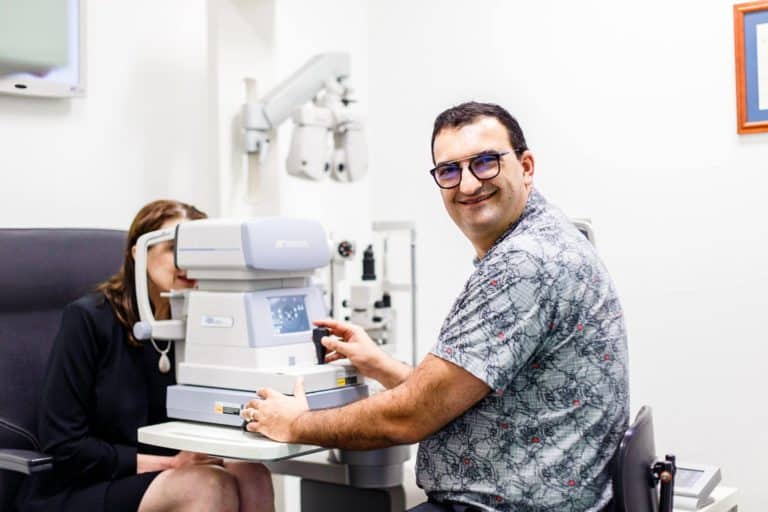In the field of eye care, it’s common for individuals to wonder, “Is a referral necessary to visit a behavioural optometrist?” This is a frequent query among those seeking specialized vision services.
You may also have additional questions such as “What key symptoms indicate that I should see a behavioural optometrist?”, “How can I find the most suitable practitioner for my unique needs?”, and “What experiences can I expect during my appointment?”
Whether you’re experiencing vision-related challenges or are keen to enhance your visual capabilities, knowing how to access behavioural optometry services is crucial. Let’s explore this topic thoroughly to clear up any doubts.

Decoding the Referral Process for Accessing Behavioural Optometry Services
To address the pivotal question: Generally, you DO NOT require a referral to book an appointment with a behavioural optometrist. These professionals are recognized as primary eye care providers, enabling you to schedule a consultation directly without needing to consult another healthcare provider first.
Nevertheless, there are specific situations in which a referral can be beneficial:
Integrated care strategy: If you are undergoing treatment for related challenges like learning disabilities or neurological conditions, your current healthcare provider might refer you to a behavioural optometrist as part of a complete treatment plan.
Complex medical scenarios: In certain cases, if you have a complicated medical history or unique eye problems, your general optometrist or ophthalmologist may suggest a referral to a behavioural optometrist for more specialized care.
While these situations exist, they are not the norm. Most individuals can independently choose to consult a behavioural optometrist without requiring a formal referral.
At Eyes by Design, we accommodate direct appointments as well as referrals, ensuring that anyone seeking our specialized services can access the necessary care without unnecessary barriers.
Recognizing the Symptoms Indicating the Need for a Behavioural Optometrist
It’s essential to identify when to seek the expertise of a behavioural optometrist. Even though referrals are generally not required, being aware of the signs that suggest you may benefit from behavioural optometry services is crucial. Consider scheduling an appointment if you or your child are experiencing:
- Chronic reading difficulties: Struggles with reading speed, comprehension, or frequently losing your place may indicate a need for professional assistance.
- Eye fatigue or headaches: These symptoms often arise during close-up tasks such as reading or using a computer, potentially signaling underlying issues.
- Subpar sports performance: If you find it challenging to assess distances or effectively track moving objects, consulting a behavioural optometrist could provide valuable insights.
- Attention and focus challenges: Difficulty sustaining attention on visual tasks or becoming easily distracted may highlight the need for specialized support.
- Coordination difficulties: Problems with hand-eye coordination or general clumsiness can often be improved through behavioural optometry.
- Visual discomfort after screen use: Experiencing fatigue, blurred vision, or discomfort following digital device usage is a common concern.
- Learning challenges: If a child faces academic obstacles despite normal intelligence and effort, it may be wise to consider a behavioural optometry assessment.
- History of head trauma or concussion: If visual symptoms persist after head injuries, seeking expert evaluation is critical.
- Diagnosis of dyslexia or ADHD: These conditions frequently coincide with visual processing issues that a behavioural optometrist can effectively address.
- Symptoms persist despite normal eye examinations: If traditional optometry has not resolved your visual concerns, further evaluation may be necessary.
- Profession-specific visual requirements: Careers that demand exceptional visual skills, like pilots, athletes, or surgeons, may require a consultation with a behavioural optometrist.
- Developmental issues: For children lagging in visual-motor skills, early intervention can lead to significant improvements.
It’s important to understand that you don’t need to wait for a referral to address these concerns. If you identify with any of these signs, feel free to directly contact a behavioural optometrist, like myself, at Eyes by Design for a thorough eye assessment.
Empowering Yourself Through Proactive Eye Care Advocacy
While referrals are typically unnecessary for behavioural optometry, the significance of self-advocacy in eye care cannot be overstated. As a patient, you possess both the right and the responsibility to pursue care that effectively addresses your visual needs. Here’s why self-advocacy is essential:
- Personalized care: You have the best insight into your symptoms and concerns. By actively seeking specialized care, you ensure that your specific needs are addressed.
- Timely intervention: Waiting for a referral can cause unnecessary delays in treatment. Self-advocacy allows for quicker access to necessary care.
- Holistic approach: Behavioural optometrists offer a comprehensive perspective on vision care that goes beyond routine eye exams.
- Empowerment: Taking charge of your eye health decisions promotes greater engagement in your healthcare journey.
- Awareness: By researching and selecting a behavioural optometrist, you gain a deeper understanding of your options for maintaining visual wellness.
- Preventive care: It’s crucial not to wait for vision issues to escalate. Proactively visiting a behavioural optometrist can help identify problems early on.
At Eyes by Design, we encourage our patients to take an active role in their vision care. If you believe that behavioural optometry could be beneficial for you, don’t hesitate to reach out directly. We are here to support your journey toward optimal visual health and performance.

Key Considerations for Selecting Your Ideal Behavioural Optometrist
Since a referral is generally not needed, the responsibility of choosing the right behavioural optometrist rests with you. Here are several vital factors to consider:
- Qualifications: Ensure that the optometrist has received specific training and certification in behavioural optometry.
- Experience: Look for a practitioner with a successful track record of treating your specific concerns.
- Technology: Choose a practice that utilizes the latest technology for assessments and treatments to ensure the highest standard of care.
- Treatment philosophy: Select an optometrist whose approach aligns with your personal healthcare values and goals.
- Communication: Seek a practitioner who communicates clearly and listens attentively to your concerns.
- Accessibility: Assess the convenience of the practice’s location and the availability of appointment times.
- Patient feedback: Read reviews or ask for testimonials from current patients to gauge the quality of care provided.
- Insurance and costs: Understand which services are covered by your insurance and any potential out-of-pocket costs.
- Specializations: Some behavioural optometrists may focus on specific areas, such as pediatrics or sports vision, which might be particularly relevant to your situation.
- Collaborative care: If you have additional health concerns, choose an optometrist willing to collaborate with your other healthcare providers.
At Eyes by Design, we strive to meet all these criteria by providing expert care, advanced technology, and a patient-focused approach. We encourage prospective patients to ask questions and ensure they feel comfortable before making an appointment.
What to Expect During Your First Visit to a Behavioural Optometrist
Understanding what to anticipate during your initial visit can help alleviate any anxiety about the process. Here’s a typical experience you can expect at Eyes by Design:
- Thorough history-taking: We’ll discuss your visual concerns, overall health, and lifestyle factors that may influence your vision.
- Standard eye examination: This includes evaluations for visual acuity, refraction tests, and assessments of eye health.
- Specialized testing: We’ll investigate various aspects of visual function, including eye teaming, tracking, and focusing skills.
- Functional vision evaluation: This may involve tests designed to mimic real-world visual tasks.
- Visual processing assessment: We’ll examine how your brain interprets visual information, which is crucial for effective vision.
- Discussion of findings: We’ll clarify our observations and how they relate to your specific symptoms or concerns.
- Treatment recommendations: Based on our findings, we’ll propose a personalized treatment plan tailored to your needs.
- Questions and answers: We encourage you to ask questions and express any concerns regarding our findings or suggestions.
- Next steps: We’ll outline the proposed treatment process and schedule follow-up appointments if necessary.
Remember, this process is not solely about assessing your eye health; it’s also about enhancing your overall visual performance and quality of life. Arrive prepared with questions and be ready to actively engage in your care.
The Vital Importance of Behavioural Optometry for Your Comprehensive Health
Behavioural optometry significantly contributes to your overall health and well-being in numerous ways:
- Cognitive enhancement: Clear vision is fundamental for effective learning and information processing.
- Physical wellness: Vision problems can lead to poor posture and physical strain, negatively impacting overall health.
- Mental well-being: Vision challenges can contribute to heightened anxiety and diminished self-esteem.
- Work efficiency: Optimal visual capabilities are crucial for success in both professional and academic settings.
- Quality of life: Attaining clear, comfortable vision enhances daily activities and social interactions.
- Safety: Good vision and effective visual processing are essential for safe activities, including driving.
- Social connectivity: Visual cues play a crucial role in non-verbal communication, influencing relationships.
- Preventive health care: Early intervention can help prevent the progression of vision issues, safeguarding your long-term health.
By thoroughly addressing visual function, behavioural optometrists greatly enhance overall health and well-being. This comprehensive approach underscores the necessity of seeking specialized care whenever necessary, regardless of whether a referral is involved.
Effective Strategies for Accessing Behavioural Optometry Services
Although a referral is usually not needed to consult a behavioural optometrist, understanding when and how to access this specialized care is essential. At Eyes by Design, we are dedicated to delivering accessible, comprehensive vision care that goes beyond standard eye examinations.
Whether you are facing specific visual challenges or simply wish to enhance your visual performance, do not let the absence of a referral prevent you from seeking assistance. Take control of your visual health by reaching out directly to a qualified behavioural optometrist.
Remember, your vision impacts every facet of your life. By choosing behavioural optometry, you are making a valuable investment in your overall well-being and quality of life.
We encourage you to listen to your body, recognize the signs that may indicate the need for specialized care, and take proactive steps toward achieving optimal visual health.
If you have any questions or wish to schedule a routine eye exam, please feel free to contact us at Eyes by Design. Your journey to improved vision starts here.
This article aims to enhance understanding and knowledge about general eye health topics.
It should not replace professional advice, diagnosis, or treatment.
Always consult your healthcare professional before incorporating this information into your health regimen.
Dr Nicholas Altuneg
For over two decades, my passion has been to help individuals of all ages improve their lives through enhanced vision. At Eyes by Design, vision transcends simply seeing clearly or reading small print; it fundamentally shapes your perceptions and reactions every moment of your day.
Read more about Dr Nick
Do You Need a Referral to See a Behavioural Optometrist? Everything You Need to Know
The Article: Referral to See a Behavioural Optometrist: Key Insights first appeared on https://writebuff.com.
The Article Behavioural Optometrist Referral: Essential Insights Was Found On https://limitsofstrategy.com
The Article Essential Insights on Behavioural Optometrist Referrals First Appeared ON
: https://ad4sc.com


This is a really insightful look into the world of behavioural optometry! I completely understand the apprehension some might feel about needing a referral before making an appointment. It’s reassuring to know that these specialists are accessible to anyone wanting to improve their visual functions or address specific concerns.
It’s great to hear that you found the article insightful! The referral process can feel a bit daunting at first, but it’s all about making sure you’re set up for success with the right support.
I appreciate how you’ve delved into the nuances of accessing behavioural optometry services. It’s an area that often gets overlooked, yet the impact of vision on overall well-being is profound. I remember my own journey seeking help for persistent eye strain that conventional optometry hadn’t quite addressed. It took a lot of research and exploration of all the options available, leading me to behavioural optometry, which was a game-changer.
It’s interesting to hear about your experience with eye strain and how it led you to behavioural optometry. Many people don’t realize how much our vision can affect not just our comfort but also our overall quality of life. It seems like there’s often a gap between conventional approaches and the more holistic methods that consider the psychological aspects of vision.
I really appreciate this topic you’ve brought up! It seems like there’s still a bit of confusion about behavioral optometry and how to approach it, especially for those of us who are looking to improve not just sight but also the way our brains process visual information.
You’ve hit on a really important topic here! I remember my first visit to a behavioural optometrist—it felt a bit like entering a secret society of eye care. The best part? No secret handshake required—just me and a bunch of funky gadgets!